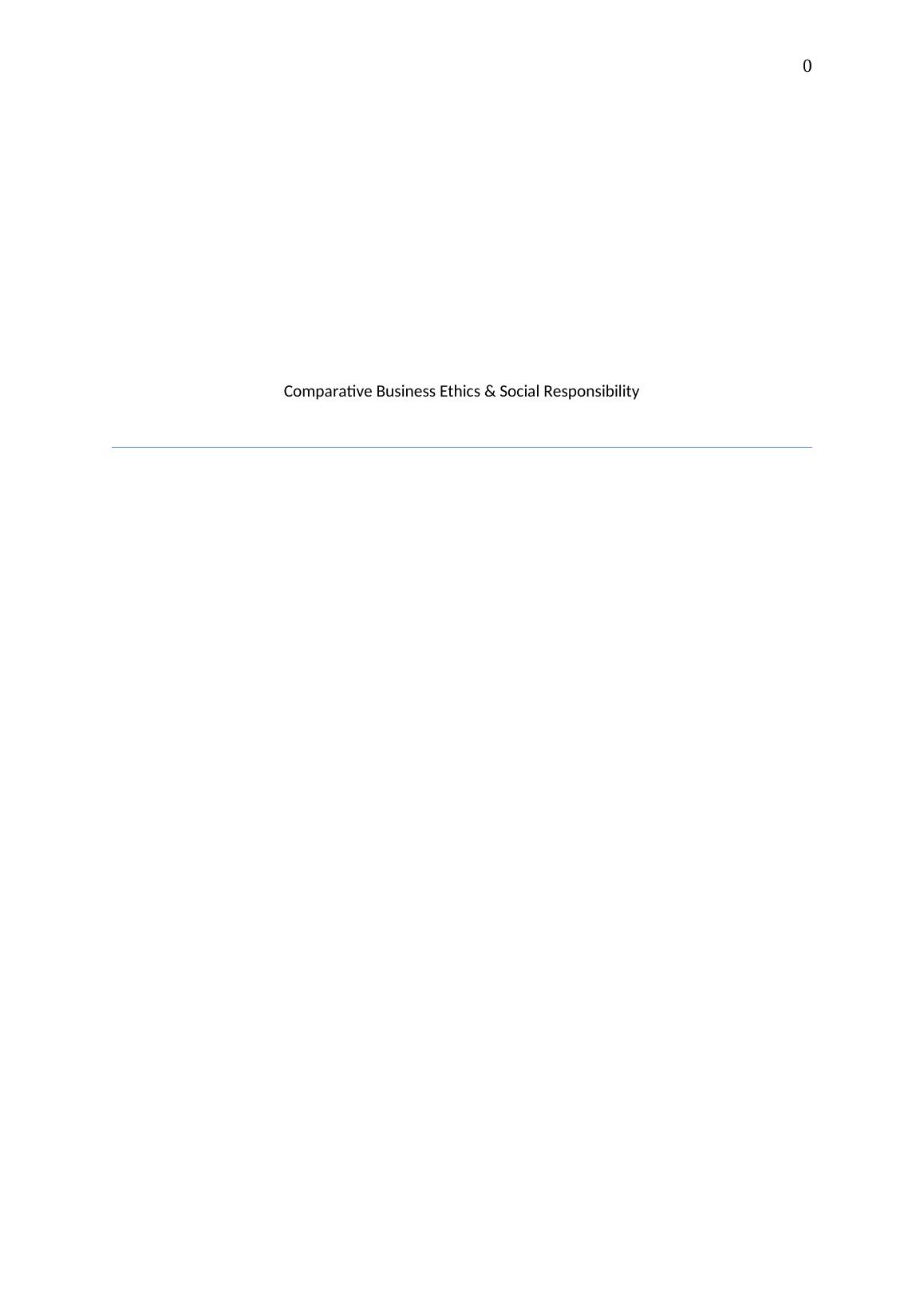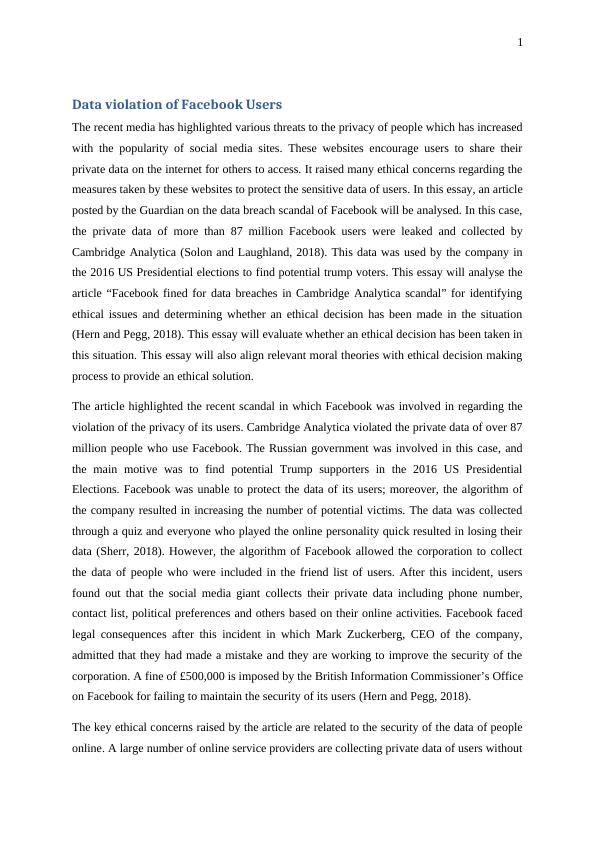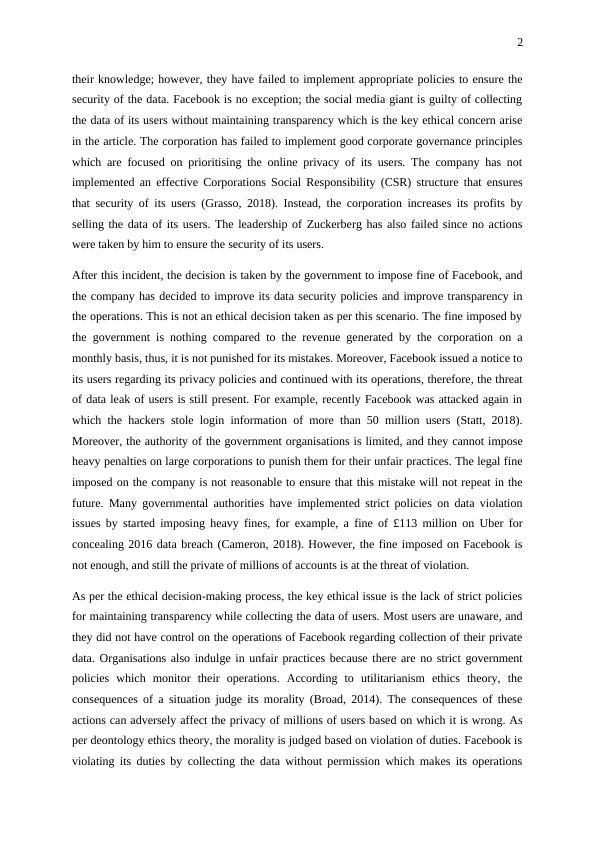Data violation of Facebook Users - Comparative Business Ethics & Social Responsibility
Added on 2023-06-03
9 Pages1493 Words181 Views
0
Comparative Business Ethics & Social Responsibility
Comparative Business Ethics & Social Responsibility

1
Data violation of Facebook Users
The recent media has highlighted various threats to the privacy of people which has increased
with the popularity of social media sites. These websites encourage users to share their
private data on the internet for others to access. It raised many ethical concerns regarding the
measures taken by these websites to protect the sensitive data of users. In this essay, an article
posted by the Guardian on the data breach scandal of Facebook will be analysed. In this case,
the private data of more than 87 million Facebook users were leaked and collected by
Cambridge Analytica (Solon and Laughland, 2018). This data was used by the company in
the 2016 US Presidential elections to find potential trump voters. This essay will analyse the
article “Facebook fined for data breaches in Cambridge Analytica scandal” for identifying
ethical issues and determining whether an ethical decision has been made in the situation
(Hern and Pegg, 2018). This essay will evaluate whether an ethical decision has been taken in
this situation. This essay will also align relevant moral theories with ethical decision making
process to provide an ethical solution.
The article highlighted the recent scandal in which Facebook was involved in regarding the
violation of the privacy of its users. Cambridge Analytica violated the private data of over 87
million people who use Facebook. The Russian government was involved in this case, and
the main motive was to find potential Trump supporters in the 2016 US Presidential
Elections. Facebook was unable to protect the data of its users; moreover, the algorithm of
the company resulted in increasing the number of potential victims. The data was collected
through a quiz and everyone who played the online personality quick resulted in losing their
data (Sherr, 2018). However, the algorithm of Facebook allowed the corporation to collect
the data of people who were included in the friend list of users. After this incident, users
found out that the social media giant collects their private data including phone number,
contact list, political preferences and others based on their online activities. Facebook faced
legal consequences after this incident in which Mark Zuckerberg, CEO of the company,
admitted that they had made a mistake and they are working to improve the security of the
corporation. A fine of £500,000 is imposed by the British Information Commissioner’s Office
on Facebook for failing to maintain the security of its users (Hern and Pegg, 2018).
The key ethical concerns raised by the article are related to the security of the data of people
online. A large number of online service providers are collecting private data of users without
Data violation of Facebook Users
The recent media has highlighted various threats to the privacy of people which has increased
with the popularity of social media sites. These websites encourage users to share their
private data on the internet for others to access. It raised many ethical concerns regarding the
measures taken by these websites to protect the sensitive data of users. In this essay, an article
posted by the Guardian on the data breach scandal of Facebook will be analysed. In this case,
the private data of more than 87 million Facebook users were leaked and collected by
Cambridge Analytica (Solon and Laughland, 2018). This data was used by the company in
the 2016 US Presidential elections to find potential trump voters. This essay will analyse the
article “Facebook fined for data breaches in Cambridge Analytica scandal” for identifying
ethical issues and determining whether an ethical decision has been made in the situation
(Hern and Pegg, 2018). This essay will evaluate whether an ethical decision has been taken in
this situation. This essay will also align relevant moral theories with ethical decision making
process to provide an ethical solution.
The article highlighted the recent scandal in which Facebook was involved in regarding the
violation of the privacy of its users. Cambridge Analytica violated the private data of over 87
million people who use Facebook. The Russian government was involved in this case, and
the main motive was to find potential Trump supporters in the 2016 US Presidential
Elections. Facebook was unable to protect the data of its users; moreover, the algorithm of
the company resulted in increasing the number of potential victims. The data was collected
through a quiz and everyone who played the online personality quick resulted in losing their
data (Sherr, 2018). However, the algorithm of Facebook allowed the corporation to collect
the data of people who were included in the friend list of users. After this incident, users
found out that the social media giant collects their private data including phone number,
contact list, political preferences and others based on their online activities. Facebook faced
legal consequences after this incident in which Mark Zuckerberg, CEO of the company,
admitted that they had made a mistake and they are working to improve the security of the
corporation. A fine of £500,000 is imposed by the British Information Commissioner’s Office
on Facebook for failing to maintain the security of its users (Hern and Pegg, 2018).
The key ethical concerns raised by the article are related to the security of the data of people
online. A large number of online service providers are collecting private data of users without

2
their knowledge; however, they have failed to implement appropriate policies to ensure the
security of the data. Facebook is no exception; the social media giant is guilty of collecting
the data of its users without maintaining transparency which is the key ethical concern arise
in the article. The corporation has failed to implement good corporate governance principles
which are focused on prioritising the online privacy of its users. The company has not
implemented an effective Corporations Social Responsibility (CSR) structure that ensures
that security of its users (Grasso, 2018). Instead, the corporation increases its profits by
selling the data of its users. The leadership of Zuckerberg has also failed since no actions
were taken by him to ensure the security of its users.
After this incident, the decision is taken by the government to impose fine of Facebook, and
the company has decided to improve its data security policies and improve transparency in
the operations. This is not an ethical decision taken as per this scenario. The fine imposed by
the government is nothing compared to the revenue generated by the corporation on a
monthly basis, thus, it is not punished for its mistakes. Moreover, Facebook issued a notice to
its users regarding its privacy policies and continued with its operations, therefore, the threat
of data leak of users is still present. For example, recently Facebook was attacked again in
which the hackers stole login information of more than 50 million users (Statt, 2018).
Moreover, the authority of the government organisations is limited, and they cannot impose
heavy penalties on large corporations to punish them for their unfair practices. The legal fine
imposed on the company is not reasonable to ensure that this mistake will not repeat in the
future. Many governmental authorities have implemented strict policies on data violation
issues by started imposing heavy fines, for example, a fine of £113 million on Uber for
concealing 2016 data breach (Cameron, 2018). However, the fine imposed on Facebook is
not enough, and still the private of millions of accounts is at the threat of violation.
As per the ethical decision-making process, the key ethical issue is the lack of strict policies
for maintaining transparency while collecting the data of users. Most users are unaware, and
they did not have control on the operations of Facebook regarding collection of their private
data. Organisations also indulge in unfair practices because there are no strict government
policies which monitor their operations. According to utilitarianism ethics theory, the
consequences of a situation judge its morality (Broad, 2014). The consequences of these
actions can adversely affect the privacy of millions of users based on which it is wrong. As
per deontology ethics theory, the morality is judged based on violation of duties. Facebook is
violating its duties by collecting the data without permission which makes its operations
their knowledge; however, they have failed to implement appropriate policies to ensure the
security of the data. Facebook is no exception; the social media giant is guilty of collecting
the data of its users without maintaining transparency which is the key ethical concern arise
in the article. The corporation has failed to implement good corporate governance principles
which are focused on prioritising the online privacy of its users. The company has not
implemented an effective Corporations Social Responsibility (CSR) structure that ensures
that security of its users (Grasso, 2018). Instead, the corporation increases its profits by
selling the data of its users. The leadership of Zuckerberg has also failed since no actions
were taken by him to ensure the security of its users.
After this incident, the decision is taken by the government to impose fine of Facebook, and
the company has decided to improve its data security policies and improve transparency in
the operations. This is not an ethical decision taken as per this scenario. The fine imposed by
the government is nothing compared to the revenue generated by the corporation on a
monthly basis, thus, it is not punished for its mistakes. Moreover, Facebook issued a notice to
its users regarding its privacy policies and continued with its operations, therefore, the threat
of data leak of users is still present. For example, recently Facebook was attacked again in
which the hackers stole login information of more than 50 million users (Statt, 2018).
Moreover, the authority of the government organisations is limited, and they cannot impose
heavy penalties on large corporations to punish them for their unfair practices. The legal fine
imposed on the company is not reasonable to ensure that this mistake will not repeat in the
future. Many governmental authorities have implemented strict policies on data violation
issues by started imposing heavy fines, for example, a fine of £113 million on Uber for
concealing 2016 data breach (Cameron, 2018). However, the fine imposed on Facebook is
not enough, and still the private of millions of accounts is at the threat of violation.
As per the ethical decision-making process, the key ethical issue is the lack of strict policies
for maintaining transparency while collecting the data of users. Most users are unaware, and
they did not have control on the operations of Facebook regarding collection of their private
data. Organisations also indulge in unfair practices because there are no strict government
policies which monitor their operations. According to utilitarianism ethics theory, the
consequences of a situation judge its morality (Broad, 2014). The consequences of these
actions can adversely affect the privacy of millions of users based on which it is wrong. As
per deontology ethics theory, the morality is judged based on violation of duties. Facebook is
violating its duties by collecting the data without permission which makes its operations

End of preview
Want to access all the pages? Upload your documents or become a member.
Related Documents
Cambridge Analytica Scandal: An Ethical and Legal Analysislg...
|10
|3090
|51
Ethical Issue relating to Facebooklg...
|13
|2642
|470
Facebook Data Mining Scandal: An Ethical Perspectivelg...
|12
|2573
|430
Business Ethics .lg...
|22
|5738
|346
Facebook Sued Over Cambridge Analytica Data Leak: An Ethical Analysislg...
|11
|2664
|314
Cambridge Analytica Scandallg...
|12
|2575
|101